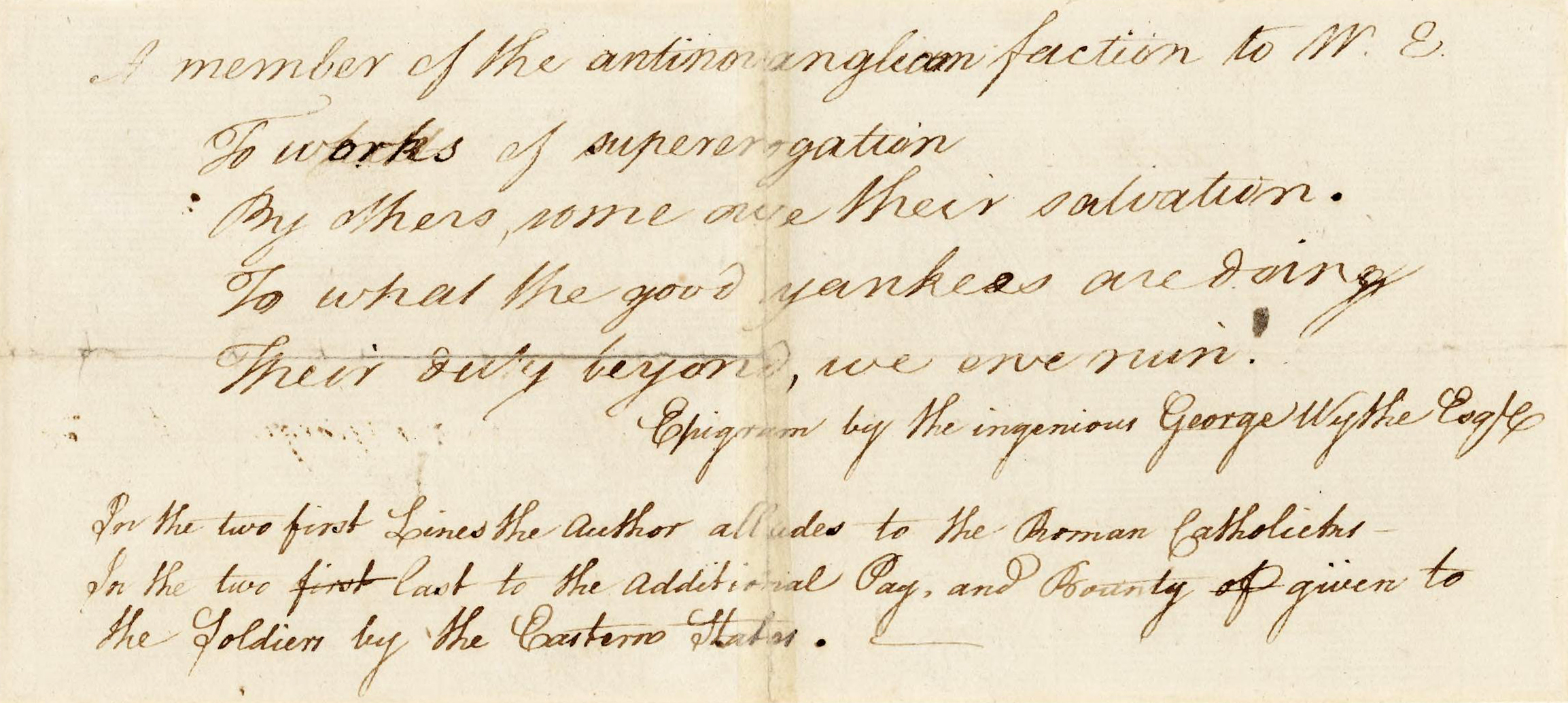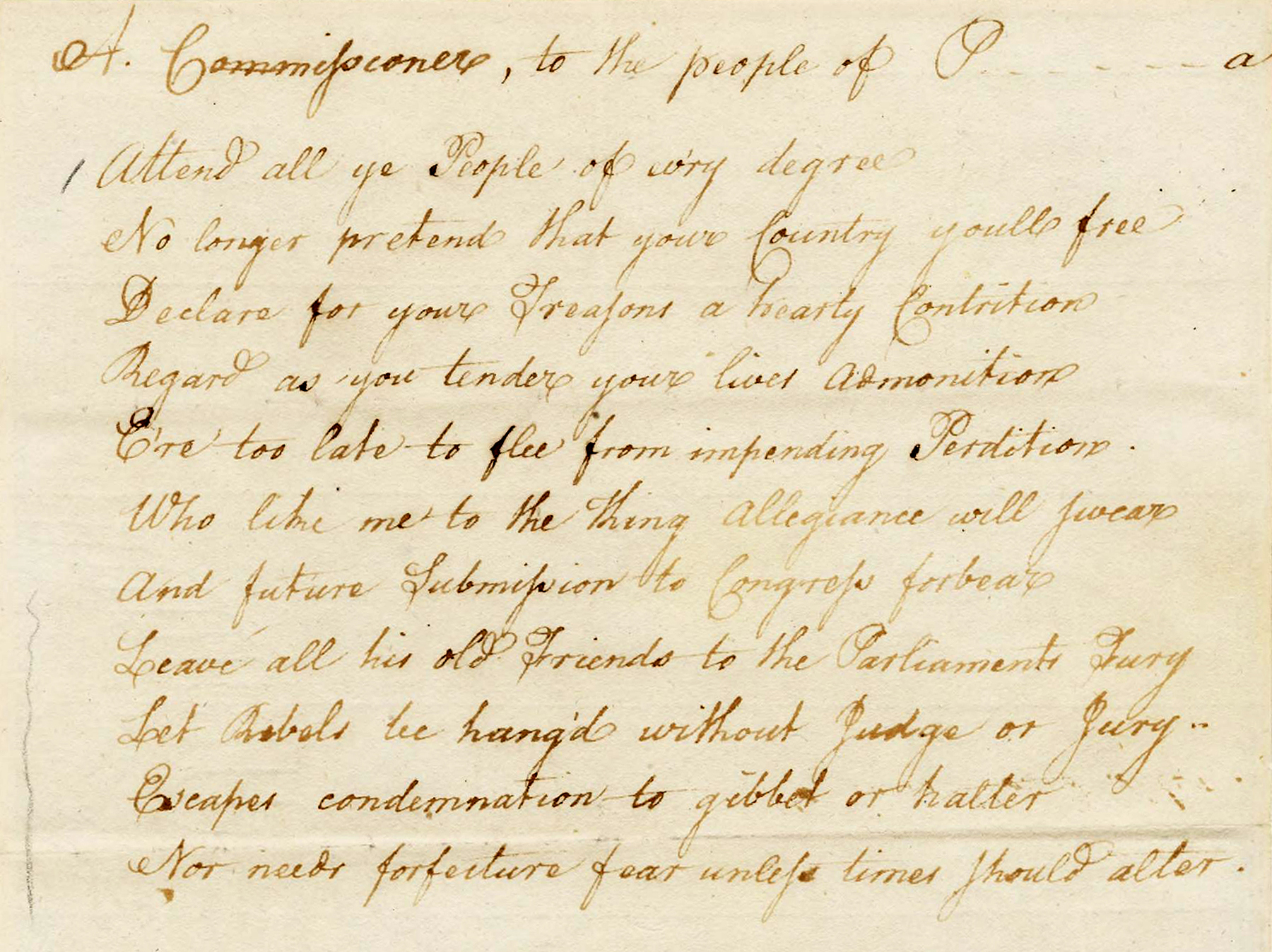Difference between revisions of "Poems on Witty Subjects in Congress"
(→"A Commissioner, to the People of Philadelphia," by William Ellery) |
|||
| Line 295: | Line 295: | ||
| | | | ||
[[File:PoemsOnWittySubjectsInCongressP13.jpg|thumb|600px|Page thirteen from [https://archive.org/details/poemsonwittysubj00elle ''Poems on Witty Subjects in Congress,''] from the [https://www.bpl.org/ Boston Public Library's] [https://archive.org/details/bplscarwm American Revolutionary War Manuscripts Collection.]]] | [[File:PoemsOnWittySubjectsInCongressP13.jpg|thumb|600px|Page thirteen from [https://archive.org/details/poemsonwittysubj00elle ''Poems on Witty Subjects in Congress,''] from the [https://www.bpl.org/ Boston Public Library's] [https://archive.org/details/bplscarwm American Revolutionary War Manuscripts Collection.]]] | ||
| + | |} | ||
| + | |||
| + | ==="Those with Whom the Powers of Government," by George Wythe=== | ||
| + | |||
| + | {| style="margin-bottom: 20px;" | ||
| + | |- style="vertical-align: top;" | ||
| + | | | ||
| + | {| | ||
| + | | style="width: 500px; margin: 20px 0 20px 20px; background-color: #f9f7e0; border: 1px solid #000000; padding: 20px 50px;" | | ||
| + | Those with whom the powers of government are entrusted should be diligently watched; and when they act otherwise than they ought should at least be told of it. Their misdoings indeed cannot in many instances be discovered especially where they | ||
| + | |||
| + | <blockquote> | ||
| + | <sup>(a)</sup>In close recess and secret conclave sit!<br /> | ||
| + | But shall loud reports of misrule only astonish us, and vanish in air?<br /> | ||
| + | As thunder rattling though the welkin flies,<br /> | ||
| + | Then rumbling shudd'ring, undulating dies. | ||
| + | </blockquote> | ||
| + | |||
| + | And will the people, disturbed by them for a moment, settle again in halcyon tranquillity? | ||
| + | |||
| + | <blockquote> | ||
| + | As when a rock, by Polyphemus thrown,<br /> | ||
| + | On some still lake falls splashing sinking down<br /> | ||
| + | The floating circles ripple to the main,<br /> | ||
| + | Disperse, and leave the surface smooth again. | ||
| + | </blockquote> | ||
| + | |||
| + | Forbid it, ye college of censors, to whose zeal and vigilance your country is so much indebted. Inquire into a late ballot, and animadvert upon the transaction, and upon those who were concerned in it, as they deserve, with your wanted prudence; although one of the persons may be he | ||
| + | |||
| + | <blockquote> | ||
| + | <sup>(a)</sup> 'Whose tongue drops manna, <sup>(b)</sup> thick as driven snow,<br /> | ||
| + | <sup>(c)</sup> 'And from whose tongue words sweet as honey flow.' | ||
| + | </blockquote> | ||
| + | |} | ||
| + | | | ||
| + | [[File:PoemsOnWittySubjectsInCongressP17.jpg|thumb|600px|Page nineteen from [https://archive.org/details/poemsonwittysubj00elle ''Poems on Witty Subjects in Congress,''] from the [https://www.bpl.org/ Boston Public Library's] [https://archive.org/details/bplscarwm American Revolutionary War Manuscripts Collection.]]] | ||
| + | |- style="vertical-align: top;" | ||
| + | | | ||
| + | {| | ||
| + | | style="width: 500px; margin: 20px 0 20px 20px; background-color: #f9f7e0; border: 1px solid #000000; padding: 20px 50px;" | | ||
| + | Page 2 | ||
| + | |} | ||
| + | | | ||
| + | [[File:PoemsOnWittySubjectsInCongressP18.jpg|thumb|600px|Page twenty from [https://archive.org/details/poemsonwittysubj00elle ''Poems on Witty Subjects in Congress,''] from the [https://www.bpl.org/ Boston Public Library's] [https://archive.org/details/bplscarwm American Revolutionary War Manuscripts Collection.]]] | ||
|} | |} | ||
Revision as of 16:19, 23 April 2014
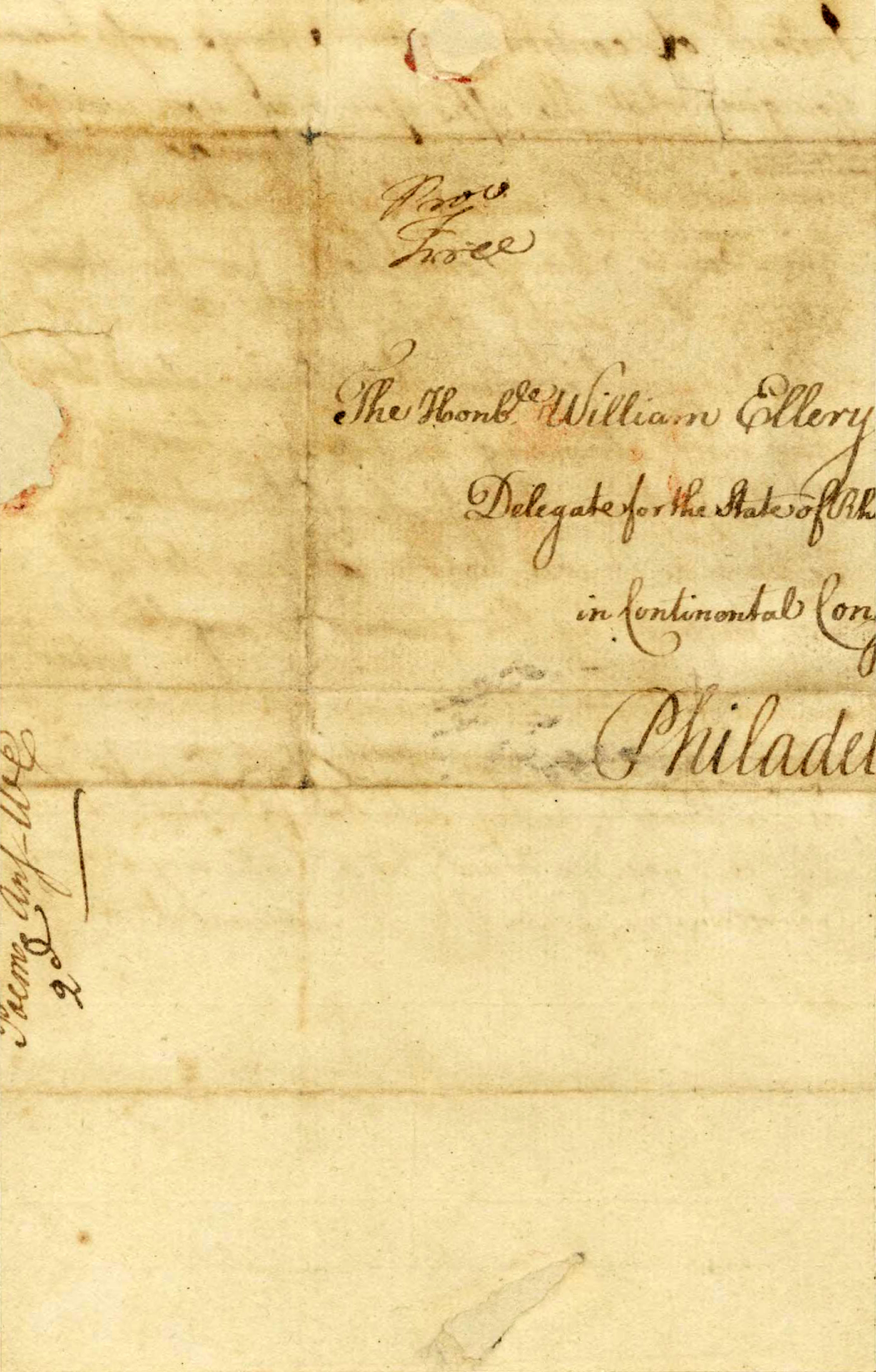
George Wythe and William Ellery, Poems on Witty Subjects in Congress, American Revolutionary War Manuscripts Collection, Boston Public Library, MS.Ch.E.8.31-33.[1]
Contents
- 1 Manuscript text, November-December 1776
- 1.1 "A Member of the Antinovanglian Faction to W. E.," by George Wythe (VA)
- 1.2 "A Novanglican to G.W.," by William Ellery (RI)
- 1.3 "Instead of Controlling Our Mary's Cross Humor," by William Ellery
- 1.4 "For Farms in Utopia, the Moon, or Some Fairyland," by George Wythe
- 1.5 With One Epigram, Though Well Hit Off" by George Wythe
- 1.6 "Unless You Will Take One Line for Your Ten," by William Ellery
- 1.7 "You've Not only Quitted Your Arrear," by George Wythe
- 1.8 "The Gen'rous Idea Your Last Piece Expresses," by William Ellery
- 1.9 Copy of Ellery's epigram, in Wythe's hand
- 1.10 Martial, Epigram 12.47, in Wythe's hand
- 1.11 "Those with Whom the Powers of Government," by George Wythe
- 1.12 "A Commissioner, to the People of Philadelphia," by William Ellery
- 2 See also
- 3 References
- 4 External links
Manuscript text, November-December 1776
"A Member of the Antinovanglian Faction to W. E.," by George Wythe (VA)
|
"A Novanglican to G.W.," by William Ellery (RI)
|
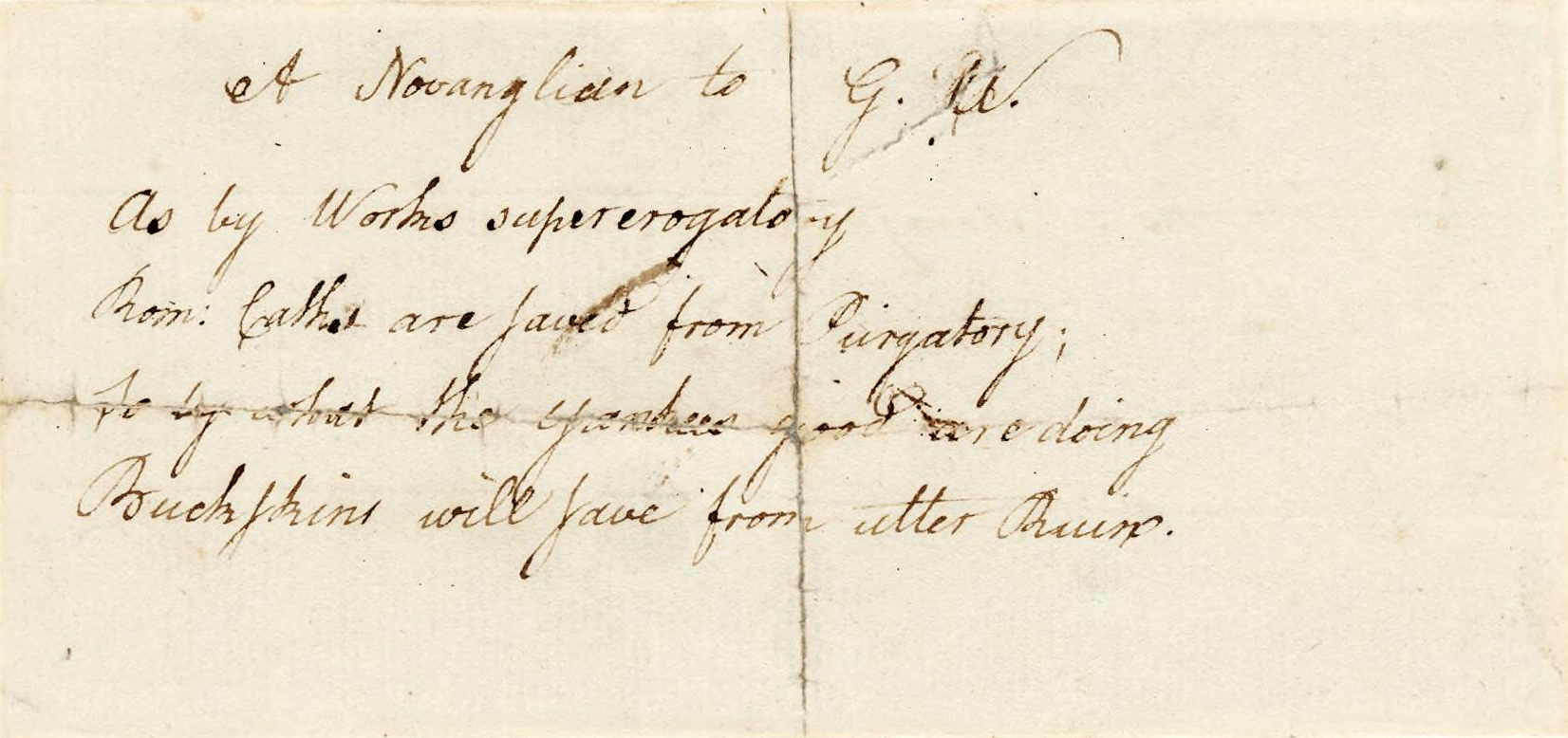 Page three from Poems on Witty Subjects in Congress, from the Boston Public Library's American Revolutionary War Manuscripts collection. |
"Instead of Controlling Our Mary's Cross Humor," by William Ellery
|
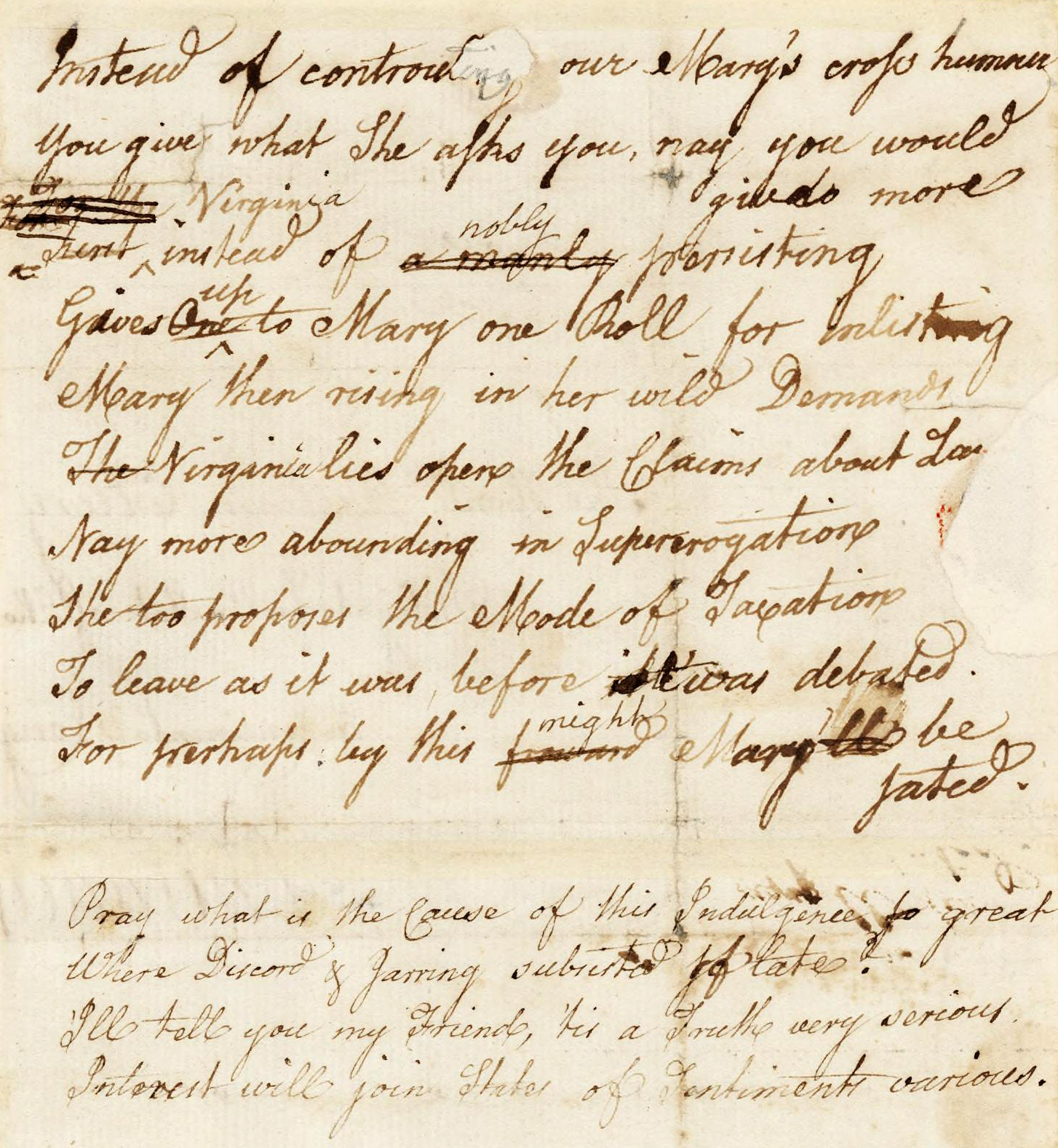 Page five from Poems on Witty Subjects in Congress, from the Boston Public Library's American Revolutionary War Manuscripts Collection. |
"For Farms in Utopia, the Moon, or Some Fairyland," by George Wythe
|
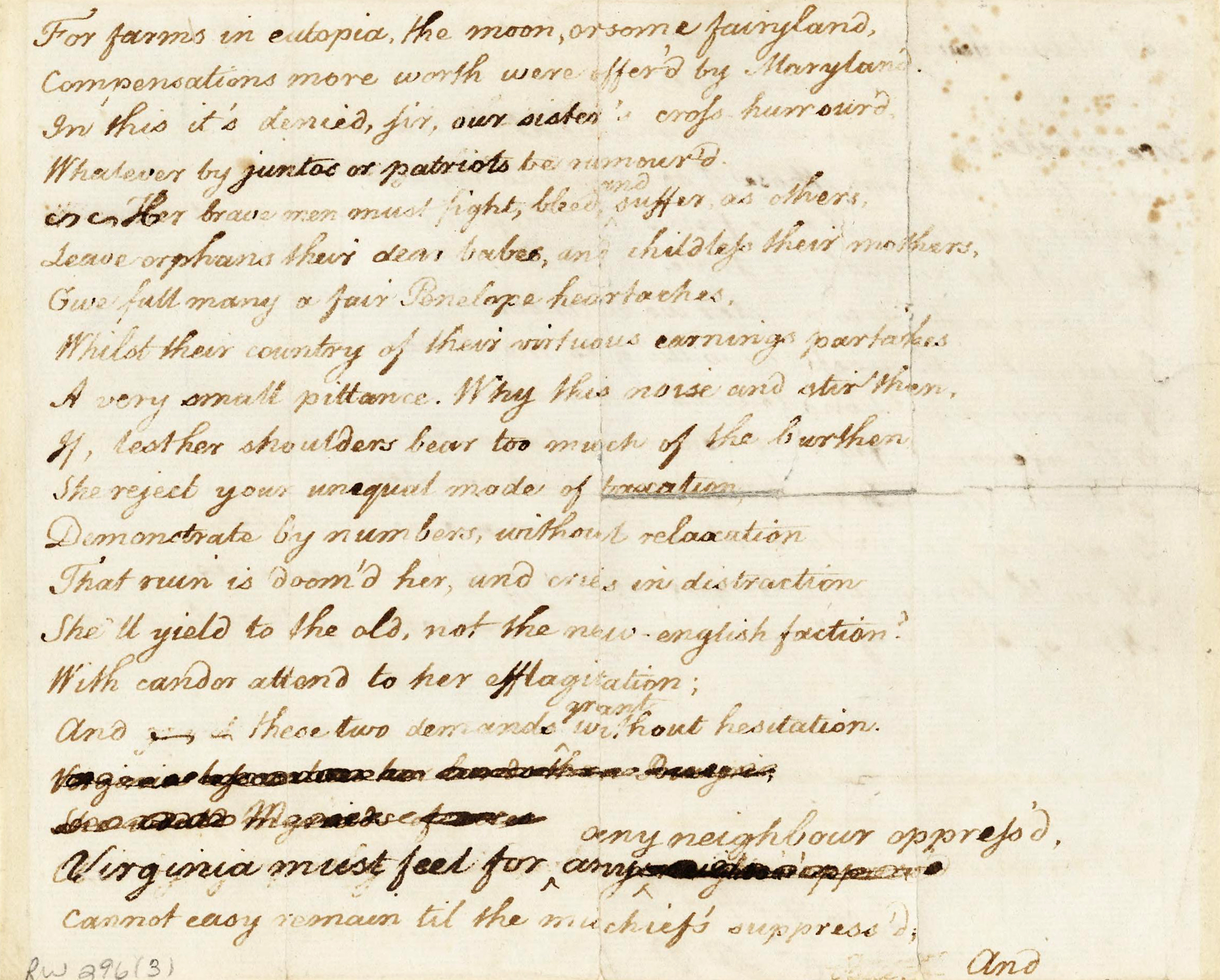 Page nine from Poems on Witty Subjects in Congress, from the Boston Public Library's American Revolutionary War Manuscripts Collection. | |
|
And if slaves you include in your capitation, |
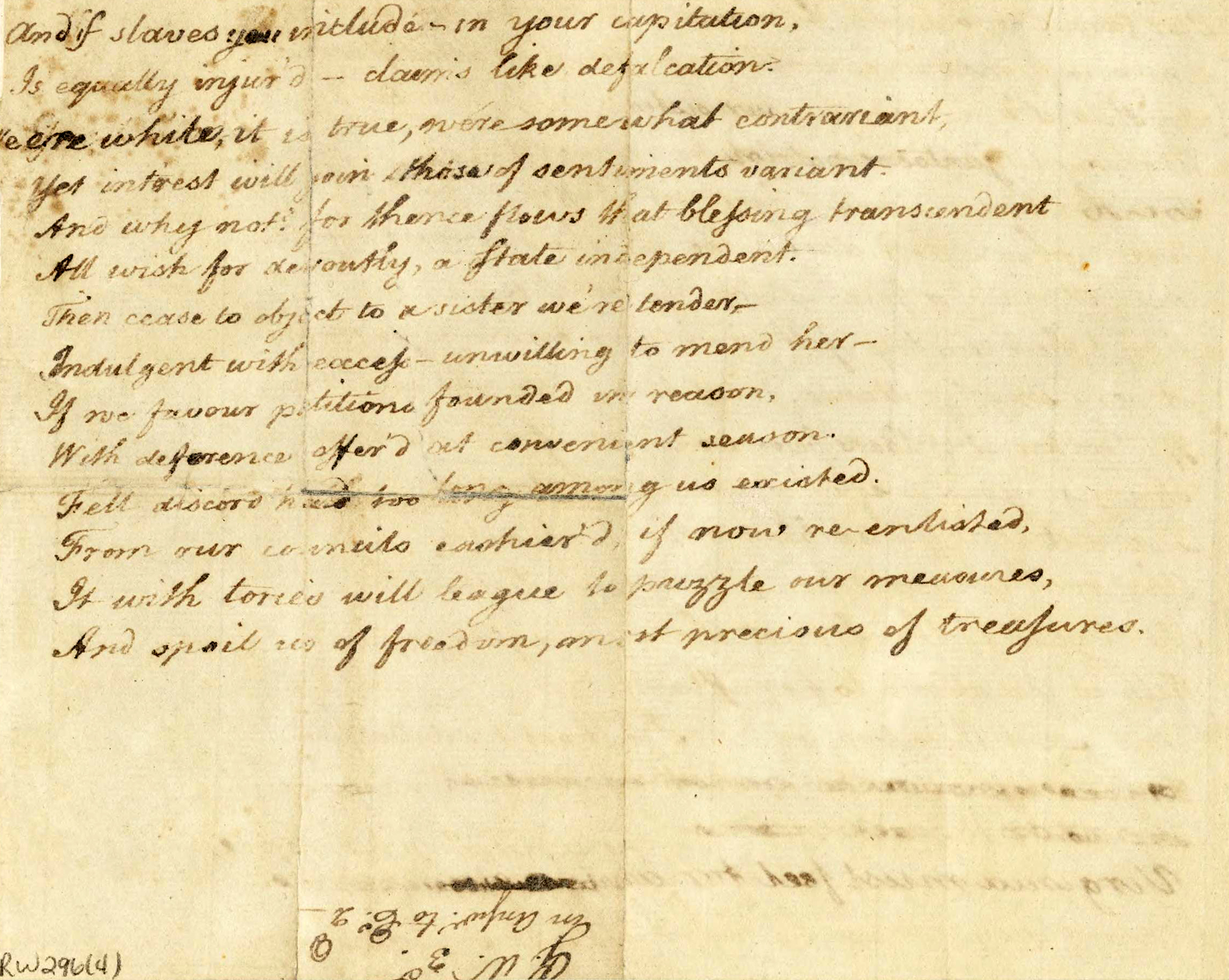 Page ten from Poems on Witty Subjects in Congress, from the Boston Public Library's American Revolutionary War Manuscripts Collection. |
With One Epigram, Though Well Hit Off" by George Wythe
|
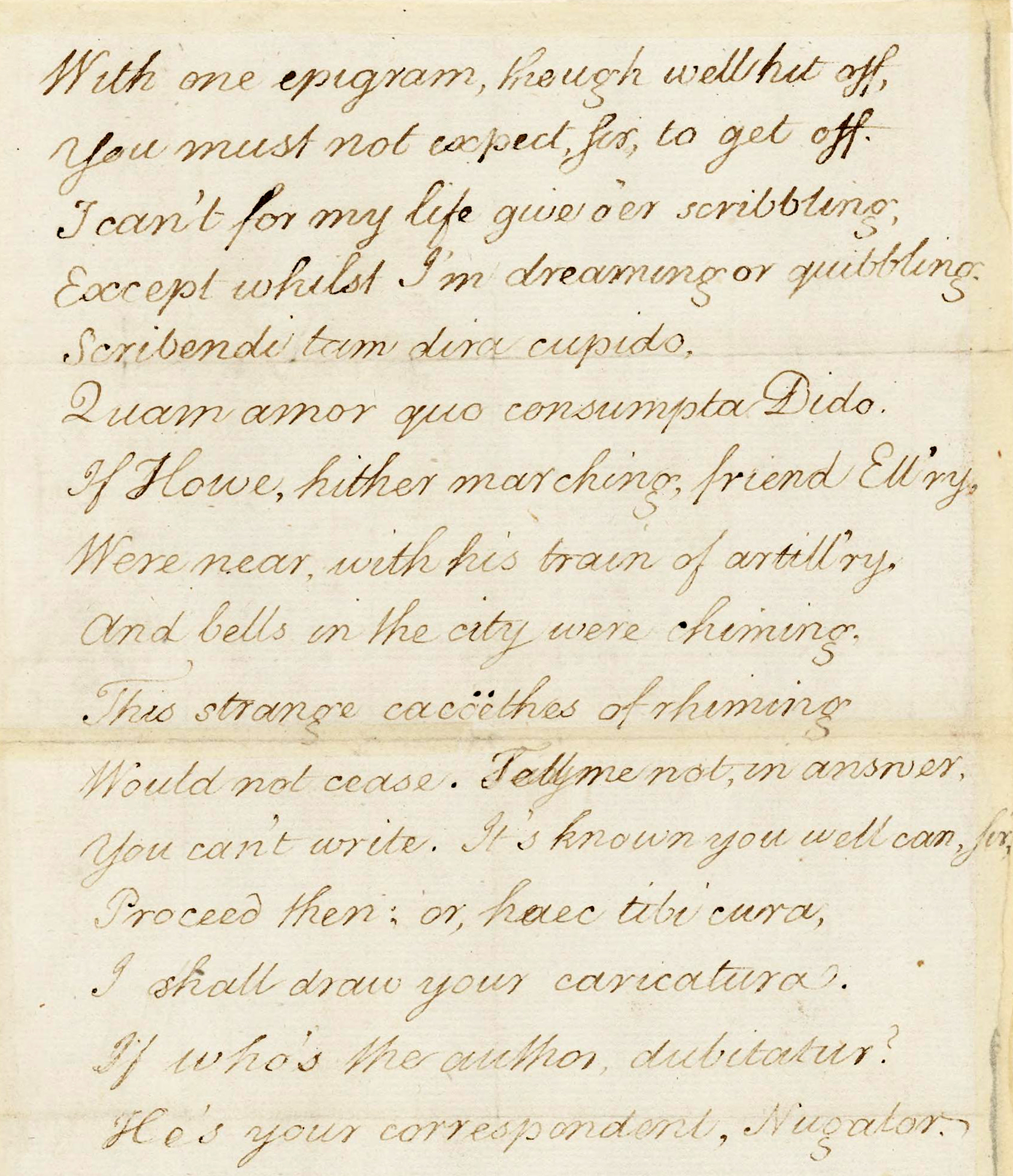 Page twenty-one from Poems on Witty Subjects in Congress, from the Boston Public Library's American Revolutionary War Manuscripts Collection. |
"Unless You Will Take One Line for Your Ten," by William Ellery
|
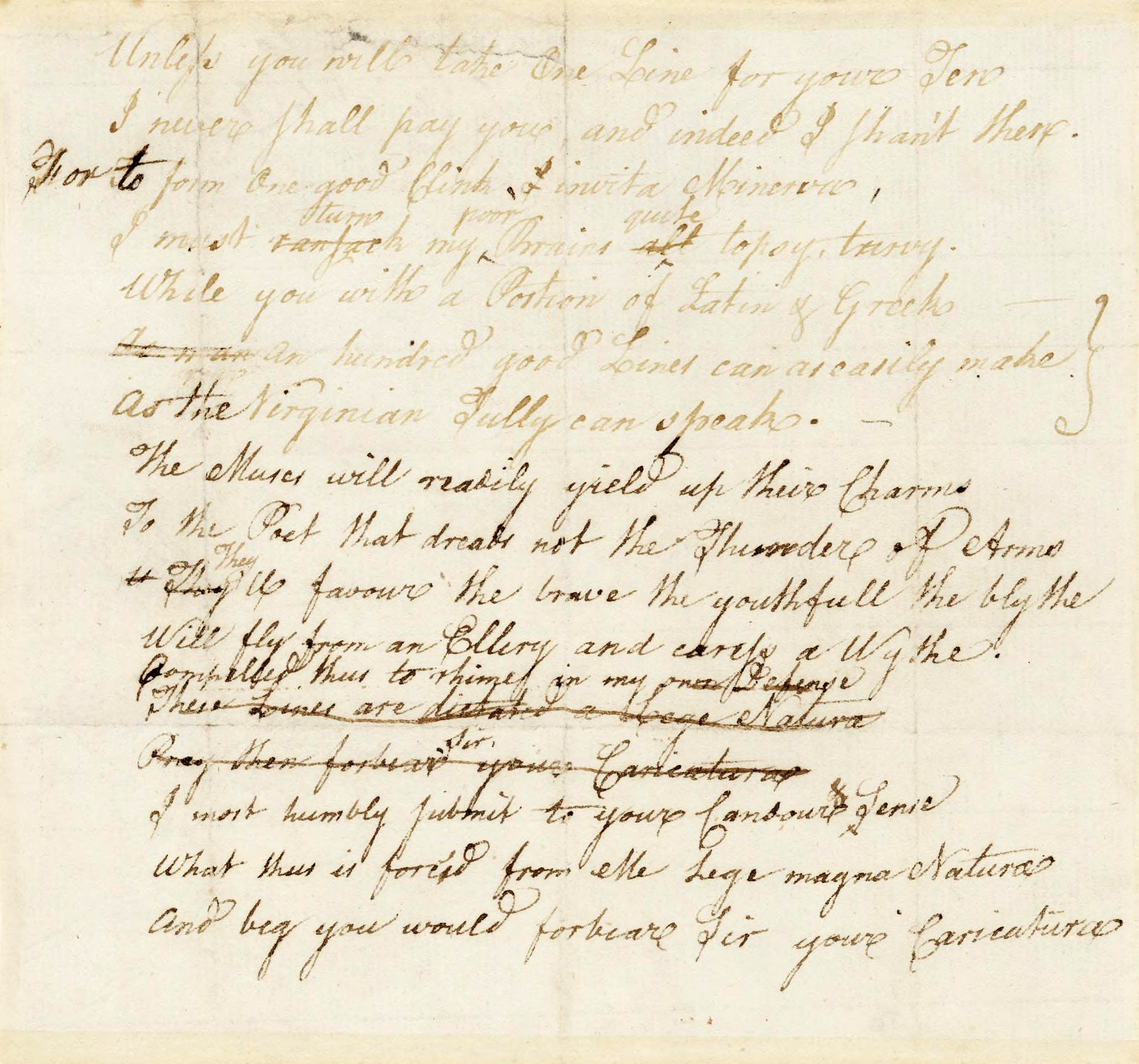 Page twenty-three from Poems on Witty Subjects in Congress, from the Boston Public Library's American Revolutionary War Manuscripts Collection. |
"You've Not only Quitted Your Arrear," by George Wythe
|
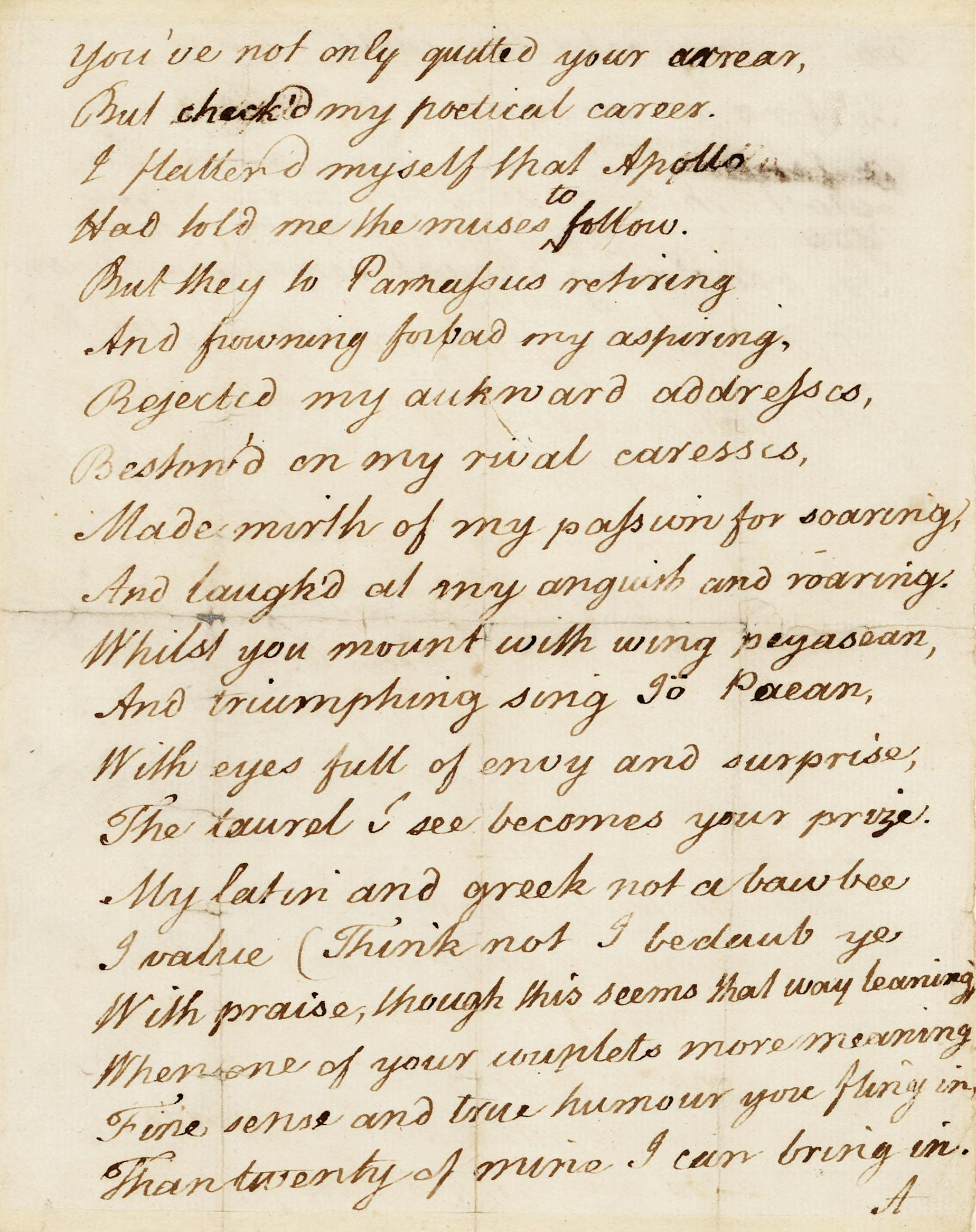 Page fifteen from Poems on Witty Subjects in Congress, from the Boston Public Library's American Revolutionary War Manuscripts Collection. |
|
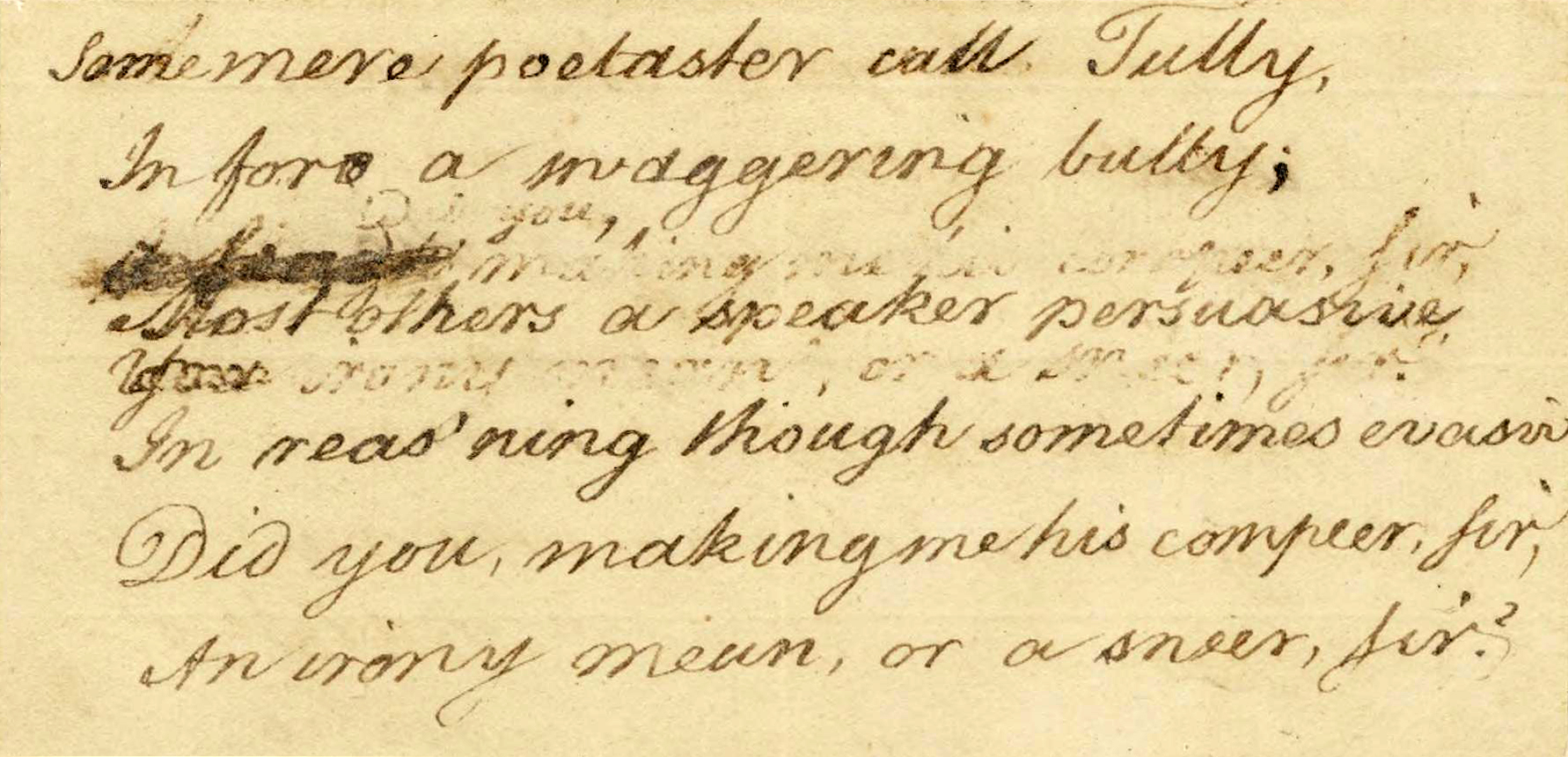 Page sixteen from Poems on Witty Subjects in Congress, from the Boston Public Library's American Revolutionary War Manuscripts Collection. |
"The Gen'rous Idea Your Last Piece Expresses," by William Ellery
|
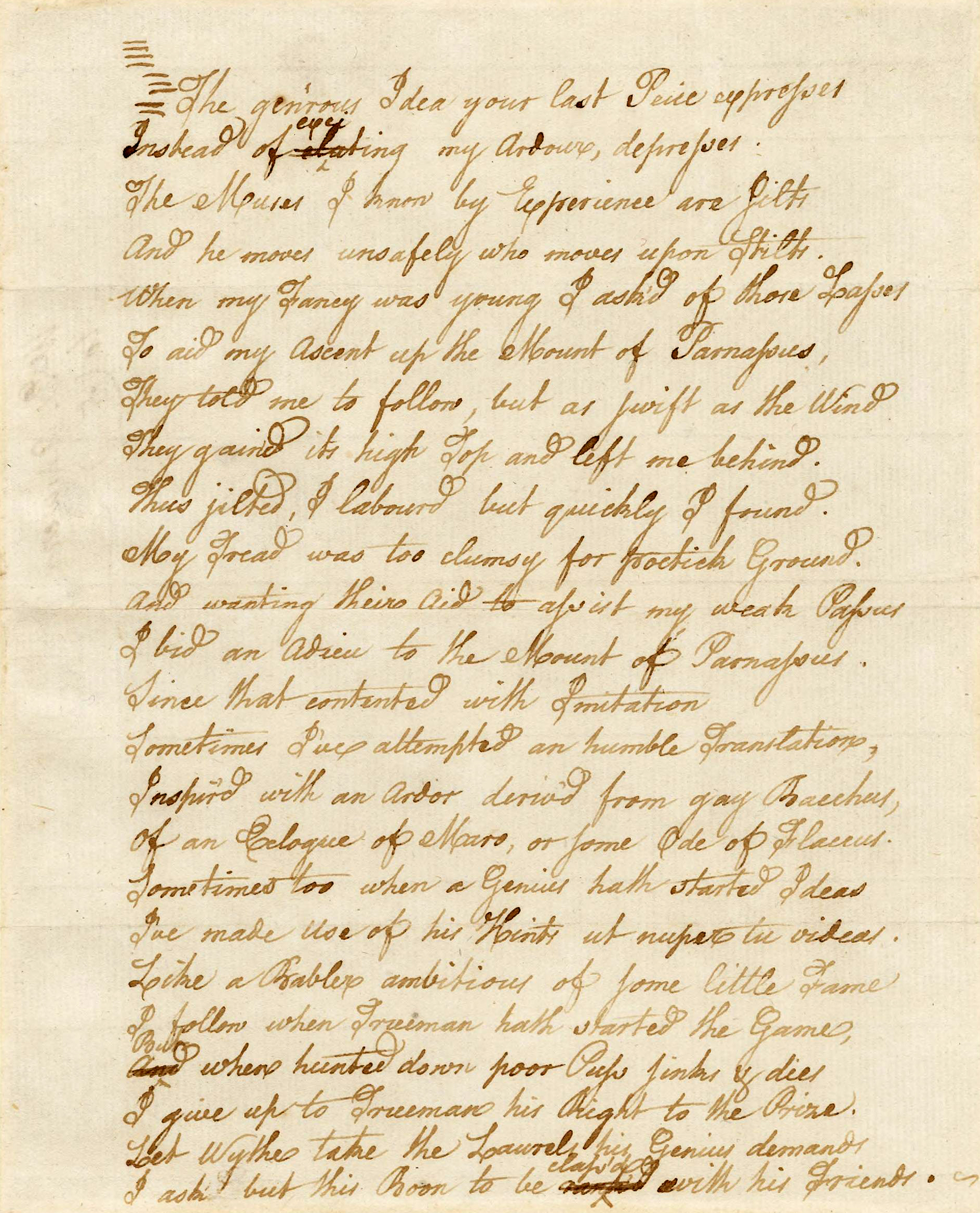 Page twenty-five from Poems on Witty Subjects in Congress, from the Boston Public Library's American Revolutionary War Manuscripts Collection. |
Copy of Ellery's epigram, in Wythe's hand
|
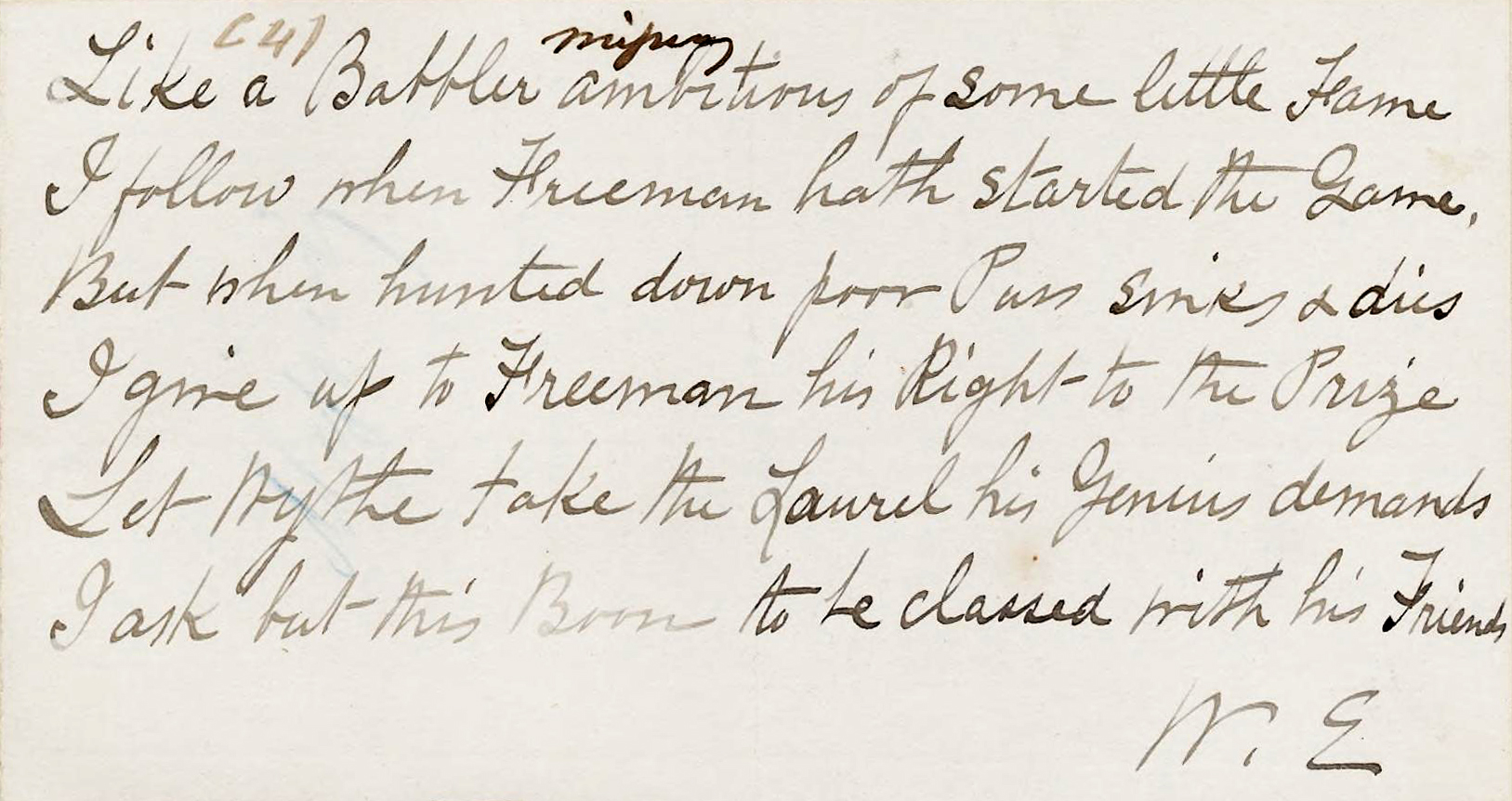 Page eleven from Poems on Witty Subjects in Congress, from the Boston Public Library's American Revolutionary War Manuscripts Collection. |
Martial, Epigram 12.47, in Wythe's hand
|
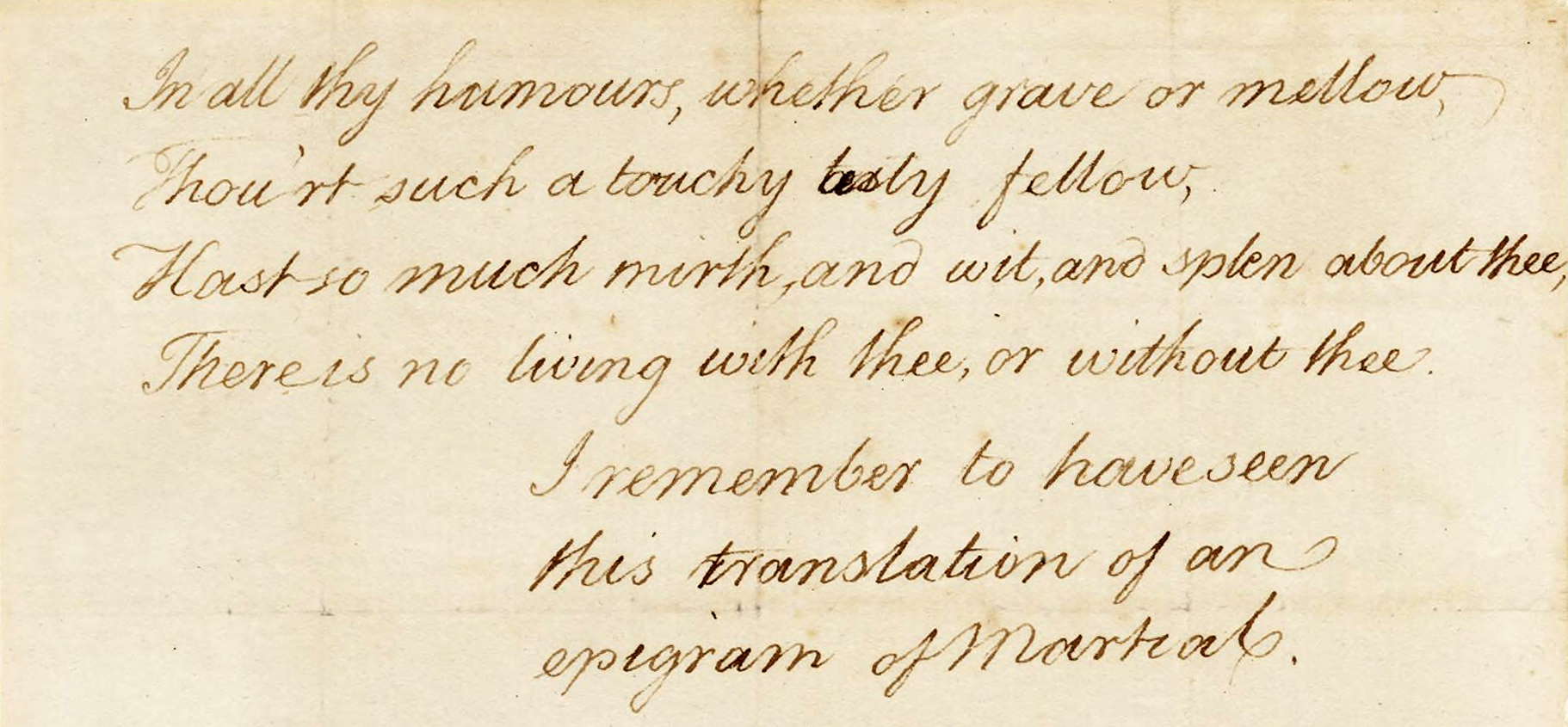 Page thirteen from Poems on Witty Subjects in Congress, from the Boston Public Library's American Revolutionary War Manuscripts Collection. |
"Those with Whom the Powers of Government," by George Wythe
|
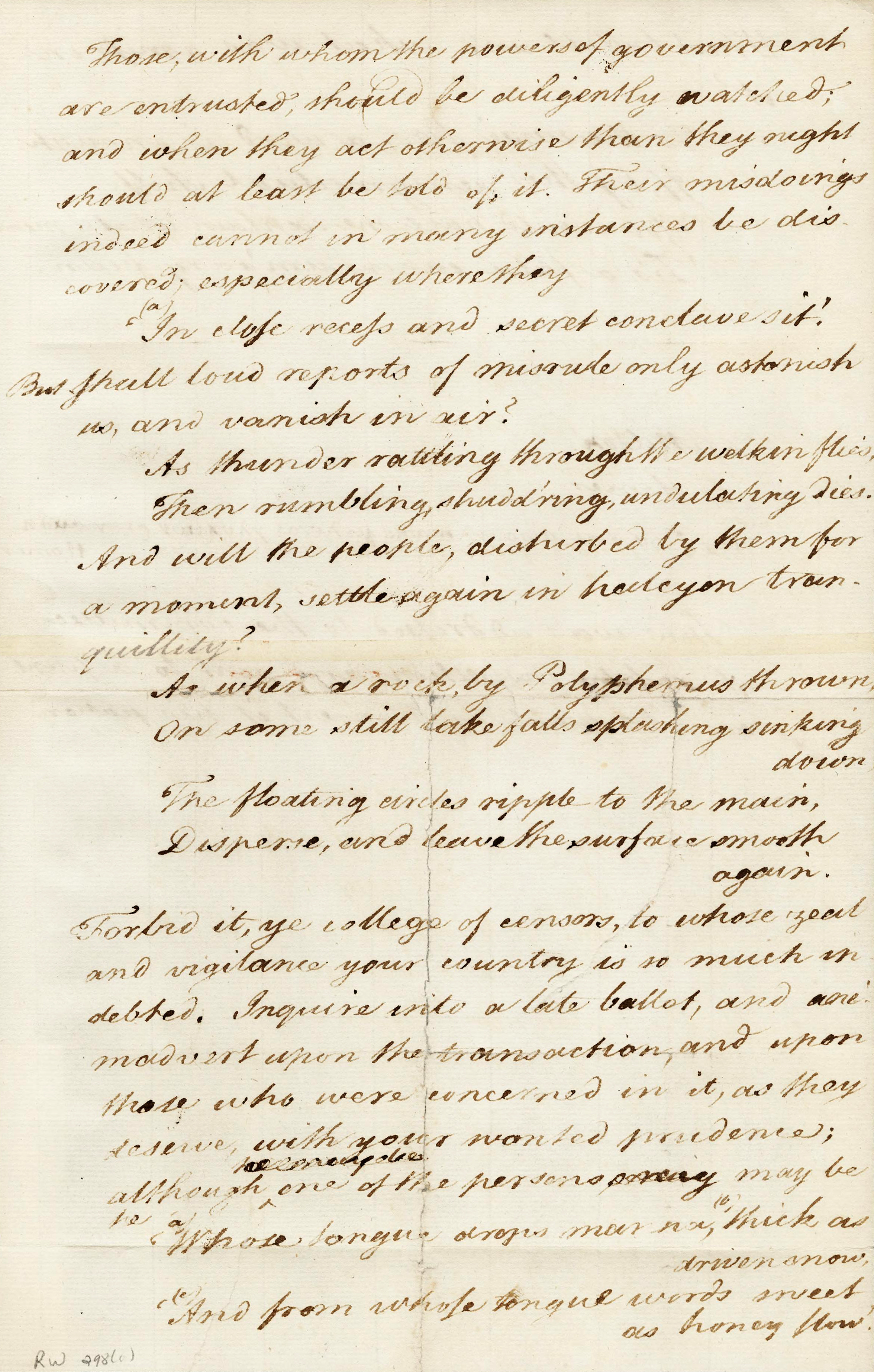 Page nineteen from Poems on Witty Subjects in Congress, from the Boston Public Library's American Revolutionary War Manuscripts Collection. | |
|
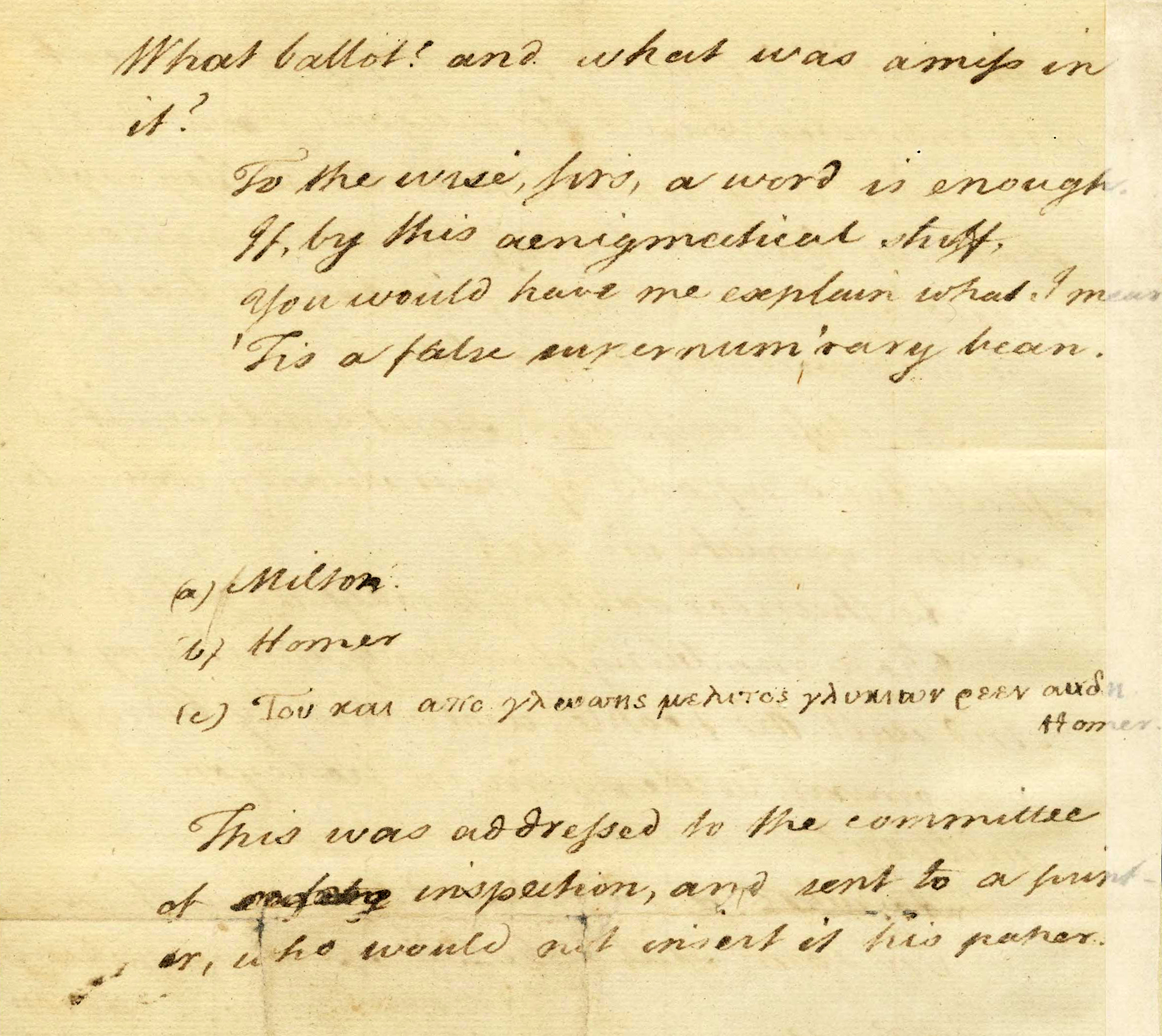 Page twenty from Poems on Witty Subjects in Congress, from the Boston Public Library's American Revolutionary War Manuscripts Collection. |
"A Commissioner, to the People of Philadelphia," by William Ellery
In this poem, Ellery chastises the conservative position of Andrew Allen, delegate from Pennsylvania, for his commonwealth's reluctance to support independence from Great Britain. The first letter of each line spells out "ANDREW ALLEN" (emphasized here). Ellery apparently attempted to get the poem published, as there is another draft with the lines transposed to avoid obvious "libellus famosos" (libel), and a dialogue with a reluctant printer:
|
|
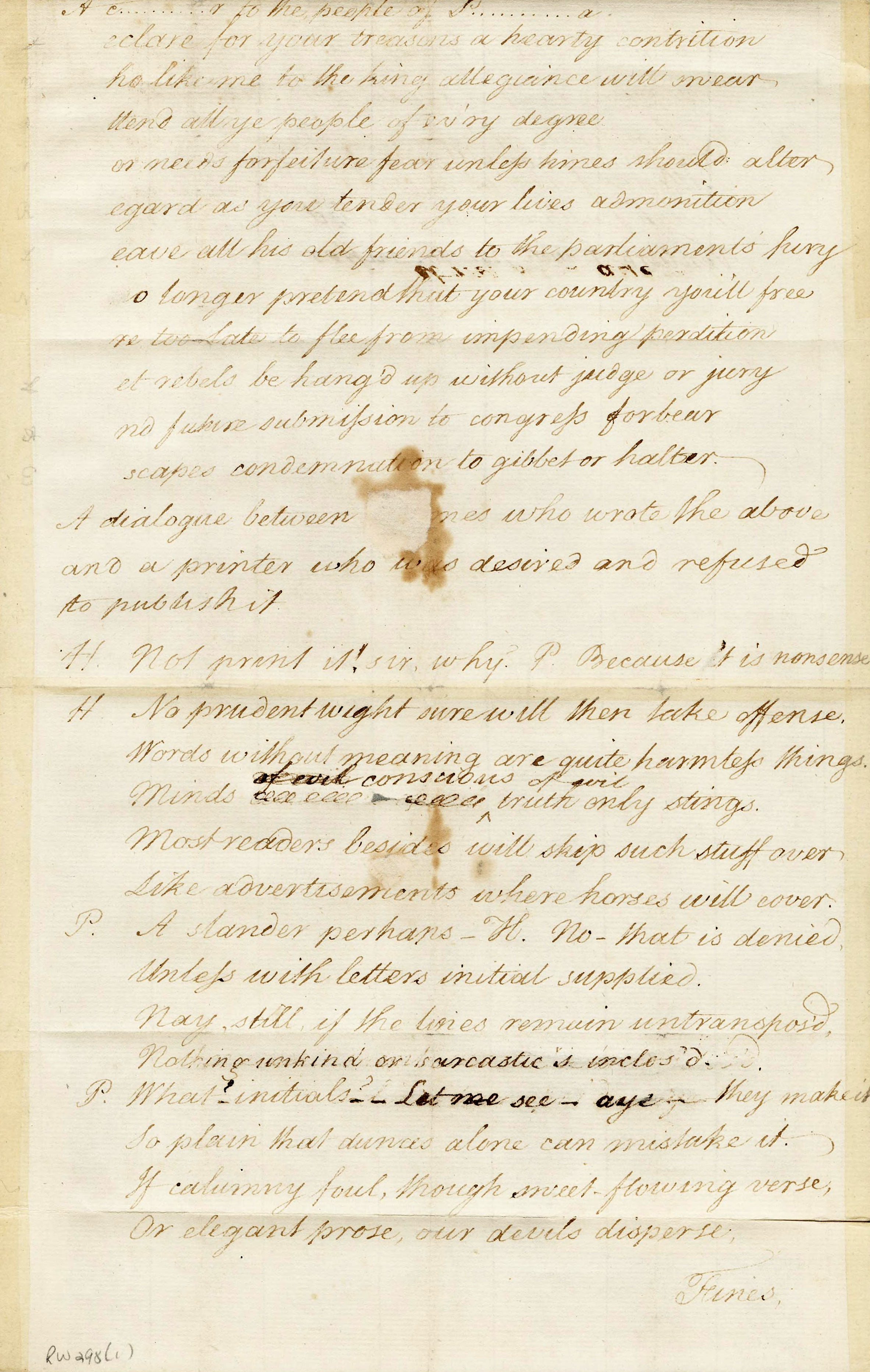 Page nineteen from Poems on Witty Subjects in Congress, from the Boston Public Library's American Revolutionary War Manuscripts Collection. | |
|
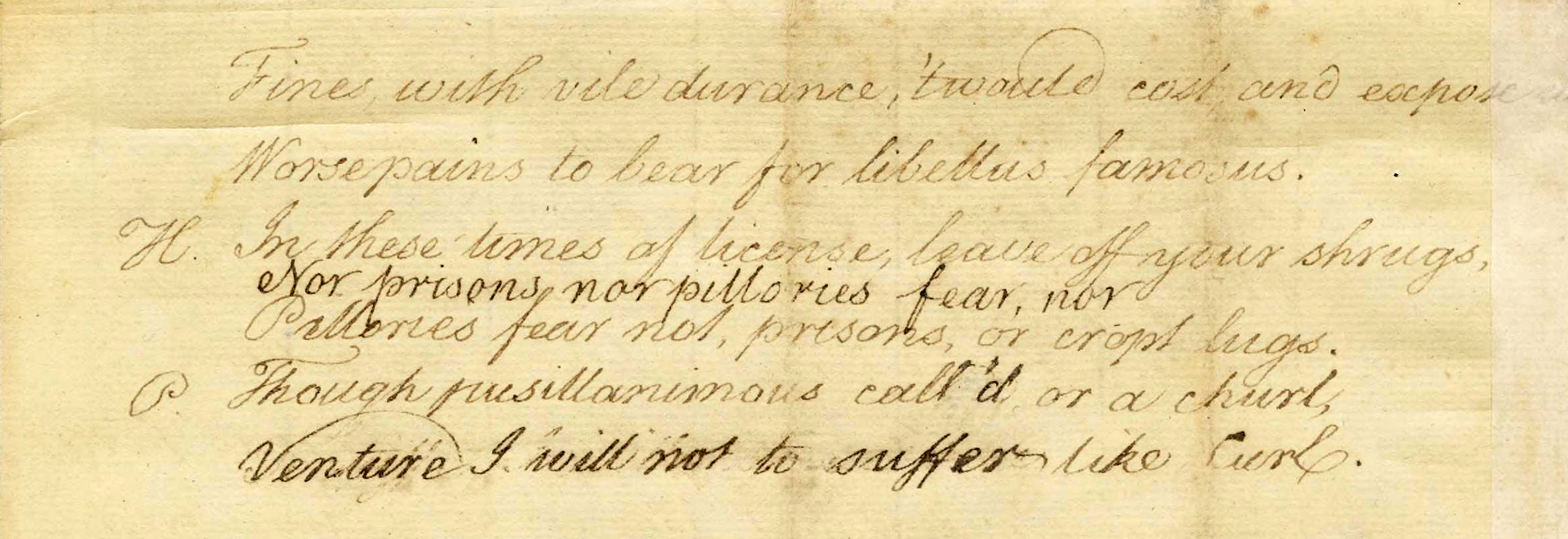 Page twenty from Poems on Witty Subjects in Congress, from the Boston Public Library's American Revolutionary War Manuscripts Collection. |
See also
References
- ↑ See W. Edwin Hemphill, "George Wythe Courts the Muses," William and Mary Quarterly 3rd ser., 9, no. 3 (July 1952), 338-345.
- ↑ "Novanglian": New Englander.
- ↑ "Dire desire to write," paraphrase of Virgil, Aeneid, Book V, line 721.
- ↑ "The love which consumed Dido," Queen of Carthage.
- ↑ General William Howe, (1729 – 1814), Commander-in-Chief of British forces during the American Revolutionary War, captured Philadelphia in September, 1777.
- ↑ Ovid, Ex Ponto III, xxxvi.
- ↑ Dubitatur: "It is doubted."
- ↑ Jester, clown.
- ↑ Defy nature, literally "go against Minerva's will." Cicero, De Officiis, I, 31, 110.
- ↑ Wythe is a Virginian Cicero: Marcus Tullius Cicero.
- ↑ A great law of Nature.
- ↑ Classical Greek cry of exultation or triumph, traditionally addressed to Apollo the healer.
- ↑ Bawbee: a Scottish half-penny.
- ↑ "As of late, you see."
- ↑ Libellus famosos: libel.
- ↑ A reference to the colonial punishment of cutting off ears?
- ↑ Edmund Curll (c. 1675 – 1747), whose name was synonymous with "unscrupulous publication and publicity."
External links
- Read these poems in the Internet Archive.
- Boston Public Library, Special Collections.
- American Revolutionary War Manuscripts at the Boston Public Library, Internet Archive.
